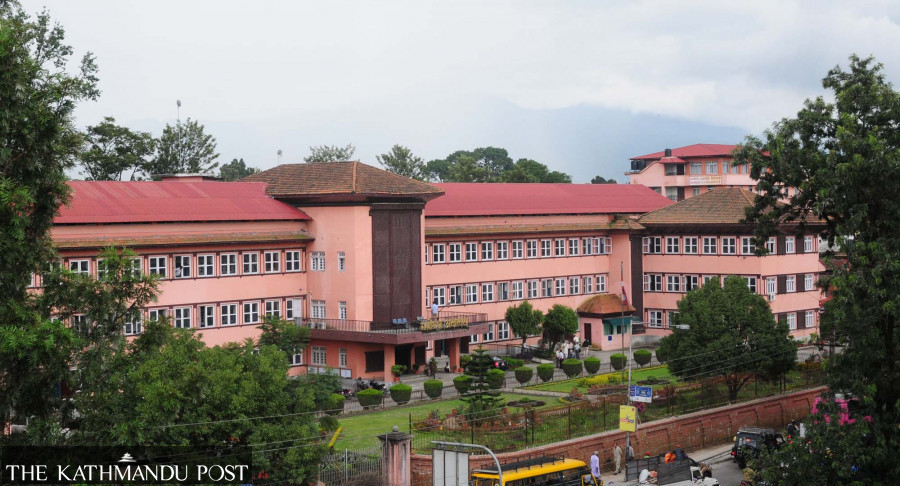Politics
Amending provision on Constitutional Bench could clear confusion, experts say
Debate over make-up of Constitutional Bench has delayed the hearing on petitions against constitutional appointments.
Binod Ghimire
The hearing on the writ petition challenging the composition of a Constitutional Bench without chief justice was affected Friday after the Nepal Bar Association and the Supreme Court Bar refused to send amici curiae as instructed by the court.
The petition was initially heard by a single bench of Justice Hari Phuyal and later by a division bench of justices Prakash Dhungana and Manoj Sharma.
The associations of the lawyers’ representatives have said they will not send amici curiae unless the court forms a Constitutional Bench to decide the matter. The two Bar associations have accused the chief justice of forming a division bench for hearing the petition by going against an earlier agreement to form a Constitutional Bench.
Whether the hearing on the petitions related to the presence of the chief justice begins this week will depend on the constitution of the bench.
Only after resolving whether the chief justice’s presence on the Constitutional Bench is necessary, the court will start hearing on the writ petitions against the nominations in the different constitutional commissions and appointments of 52 individuals including chairpersons and members in 12 constitutional bodies. Going by the ongoing tussle between the Bench and Bar, it is unlikely that the petitions challenging the decisions of the council will be solved anytime soon.
“The issue is unnecessarily tangled now,” advocate Mohan Acharya, who specialises on constitutional law, told the Post. “I blame the ruling by Justice Hari Phuyal for the present mess.” Chief Justice Cholendra Shumsher Rana on August 27 decided to recuse himself from the Constitutional Bench that was scheduled to hear petitions challenging the appointments of chairpersons and members to different constitutional bodies. He agreed to take leave, allowing the senior-most justice, Deepak Kumar Karki, to lead the bench.
Rana’s decision was supposed to help expedite the cases, as they had been pending for months. He agreed to recuse himself following the argument that as he was present in the Constitutional Council, which made the recommendations, the Constitutional Bench led by him would constitute a conflict of interest.
Petitions were filed challenging Rana's decision as Article 137 (1) of the constitution states that a Constitutional Bench is led by chief justice. On September 2, a single bench of Justice Hari Phuyal issued an interim order, observing that there was a need to finalise whether the bench can sit without the chief justice. He also asked the Nepal Bar Association and Supreme Court Bar to send two senior advocates as amici curiae.
However, they refused to send amici curiae. “Rana’s decision was rightful to give a way out to the present deadlock,” said Acharya. “Allowing the senior-most justice as well to lead the bench through an amendment to the statute is the permanent solution.”
Amid the controversy over the conflict of interest, a panel formed by the Supreme Court has given a similar suggestion. Justice Hari Krishna Karki-led committee formed to study the malpractices and corruption in the judiciary and suggest solutions in July recommended that the presence of the chief justice in the Constitutional Council needs to be reviewed. A constitutional amendment is necessary to review the presence of the chief justice in the council.
“Chief justice’s presence in both the Constitutional Council and the Constitutional Bench is responsible for the present controversy,” a member of the Karki committee told the Post on the condition of anonymity. “An amendment to the constitution is a permanent solution to the problem. However, as it is a lengthy process, the court should validate the chief justice’s decision of recusal for an immediate solution.”
The constitution can be revised by a two-thirds majority of both the Houses of the Federal Parliament. As many as 163 lawmakers from the House of Representatives must stand for the constitution amendment while a support of 36 members of the National Assembly too is necessary.
Some of the constitutional lawyers say the issue has become complicated because the court tried to interpret the constitution mechanically. Advocate Raju Prasad Chapagain, a constitutional lawyer, said recusal of the justices in cases where conflict of interest is involved comes under the principle of natural justice. “The court is not supposed to interpret the constitution mechanically. It has to be done in a context taking different legal principles and international practice into account,” he told the Post. “I believe the revision in the constitution is necessary to make it timely and broaden its acceptance. Article 131 (1) too can be revised. However, recusal of the chief justice from the Constitutional Bench is an appropriate solution to the problem at this point.”




 14.24°C Kathmandu
14.24°C Kathmandu














